
Hello Department of Biology!
Welcome to the Biology Department newsletter.
A big thanks to all who submitted news items.
Your contributions are greatly appreciated.
Happy reading!
Chair’s Note
Dear Department of Biology Community,
I hope that the spring finds all of you doing well! In this department newsletter, you’ll see how our community of students, staff, and faculty continue to do amazing work. We hope you enjoy reading about them and we invite you to contribute to our department website and upcoming newsletters by clicking here.
All the best,
Pamela Templer
Professor and Chair
Faculty Spotlights

Congratulations to Associate Professor Jennifer Bhatnagar and Co-PIs Jeff Geddes, Lucy Hutyra, and Pamela Templer for being awarded $1 million in funding from the Keck Foundation. This BU-led project will test the hypothesis that urban trees operate by a different “rule of life” than rural trees, uniquely taking advantage of aboveground atmospheric pollution as a source of nutrients, water, and stress protection.
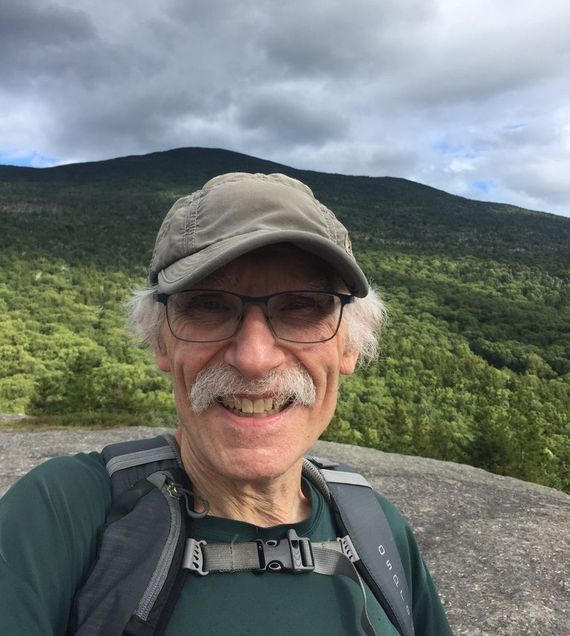 Congratulations to Associate Professor Chip Celenza for receiving the 2025 Boston University Undergraduate Academic Advising Award. This award is given each year in recognition of faculty advisors who have engaged students in the collaborative process of advising and have had a significant impact on students’ academic careers.
Congratulations to Associate Professor Chip Celenza for receiving the 2025 Boston University Undergraduate Academic Advising Award. This award is given each year in recognition of faculty advisors who have engaged students in the collaborative process of advising and have had a significant impact on students’ academic careers. 
Congratulations to Lecturer Elizabeth Co for being awarded the 2025 Gerald and Deanne Gitner Family Award for Innovation in Teaching with Technology.

Congratulations to Assistant Professor Ana Fiszbein for receiving two grants; the first from the Hevolution Foundation, Geroscience Research Opportunities for “Tracking tissue-specific gene boundaries in aging”. The second grant was awarded by the Israel Binational Science Foundation (BSF), titled “Deciphering the interplay between promoter structure and splicing decisions”. 
Congratulations to Professor Richard Primack for being a Visiting Scholar at the University of Copenhagen in Denmark for Spring of 2025, based at the Museum and Botanical Garden, collaborating on ways to detect the effects of a warming climate on plants.

Congratulations to Professor Karen Warkentin for being selected to give a public lecture, titled “Crossing boundaries, disrupting binaries: a queer perspective on the diversity of life” for the 2024 Elizabeth Laird Lecture at the University of Winnipeg, Canada. This endowed annual lecture brings members of the city and university communities together to build shared understanding.

Congratulations to Associate Professor Zeba Wunderlich for being awarded the Presidential Early Career Award for Scientists and Engineers (PECASE). The award is the highest honor bestowed by the U.S. government on early-career scientists and engineers, as awardees are recognized for their potential for leadership in their research careers.

Congratulations to Assistant Professor Meg Younger for being awarded a $1.5M Wellcome Discovery Award by the Wellcome Trust for her work on the whole-brain connectome of the female Aedes aegypti mosquito.
In Memoriam

Prof Emeritus Jelle Atema: Jelle joined our Department of Biology in 1974 and he retired in 2017. He was a marine biologist who studied the chemical ecology of lobsters, navigation in sharks, and dispersal in larval reef fishes. In addition to his outstanding research, Jelle was a flutist. You can read more about his research here.
 Prof Emerita Elizabeth Godrick: Elizabeth was a professor in the Biology department for over 40 years. She was a graduate student in our department from 1965-1970 and she joined our department as faculty in 1972 and retired in 2013. Elizabeth impacted the lives and education of literally tens of thousands of students. For many years she directed the Introductory Biology program and taught several other high-level courses. You can read more about her work here.
Prof Emerita Elizabeth Godrick: Elizabeth was a professor in the Biology department for over 40 years. She was a graduate student in our department from 1965-1970 and she joined our department as faculty in 1972 and retired in 2013. Elizabeth impacted the lives and education of literally tens of thousands of students. For many years she directed the Introductory Biology program and taught several other high-level courses. You can read more about her work here.
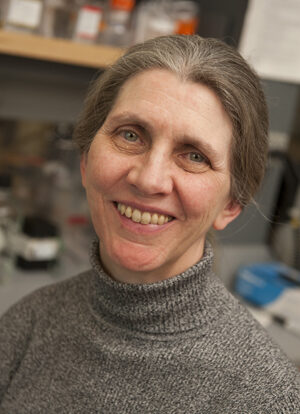
Prof Emerita Ulla Hansen: Ulla joined the Department of Biology as a professor in 1998. She retired and became Professor Emerita in 2020 and she remained active in research in our department during her retirement and we will miss her. Ulla did wonderful work in molecular pathways that regulate mammalian cell cycles with applications for treatment of cancer. You can read about her work here.
Student Spotlights
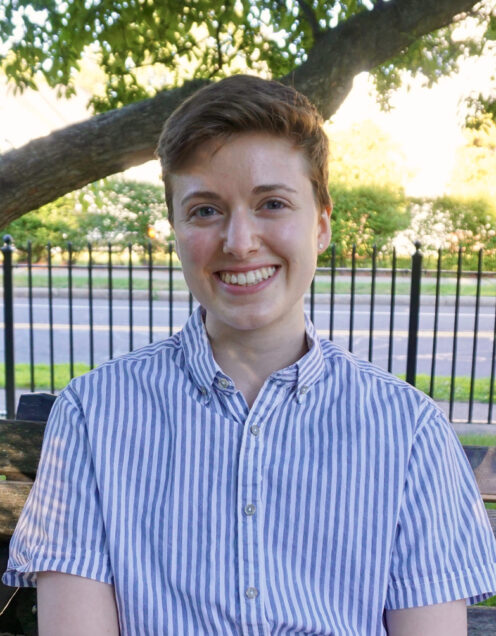 Congratulations to Emerson Conrad-Rooney for winning first place in the Student E-Poster Competition at the American Association for the Advancement of Science 2025 Annual Meeting. Emerson’s poster, titled “Effects of Growing Season Warming and Winter Freeze/Thaw Cycle on Tree Growth” came in first in the Environment and Ecology category. Emerson shared results gathered from the Templer Lab’s decade-long Climate Change Across Seasons Experiment which quantifies the combined effects of growing season warming and a smaller winter snowpack on temperate forest ecosystem processes.
Congratulations to Emerson Conrad-Rooney for winning first place in the Student E-Poster Competition at the American Association for the Advancement of Science 2025 Annual Meeting. Emerson’s poster, titled “Effects of Growing Season Warming and Winter Freeze/Thaw Cycle on Tree Growth” came in first in the Environment and Ecology category. Emerson shared results gathered from the Templer Lab’s decade-long Climate Change Across Seasons Experiment which quantifies the combined effects of growing season warming and a smaller winter snowpack on temperate forest ecosystem processes. 
Congratulations to PhD student Emma Daily for being selected to participate in the American Association for the Advancement of Science Catalyzing Advocacy in Science and Engineering (CASE) workshop April 6-9, 2025 where she met with Congressional staff.
 Congratulations to graduate student Abigail Descoteau for her work published in Developmental Biology, titled “CMTM4 is an adhesion modulator that regulates skeletal patterning and primary mesenchyme cell migration in sea urchin embryos”. This work, performed in the Bradham lab, shows that CMTM4 regulates cell adhesion and is required for normal pattern formation.
Congratulations to graduate student Abigail Descoteau for her work published in Developmental Biology, titled “CMTM4 is an adhesion modulator that regulates skeletal patterning and primary mesenchyme cell migration in sea urchin embryos”. This work, performed in the Bradham lab, shows that CMTM4 regulates cell adhesion and is required for normal pattern formation.
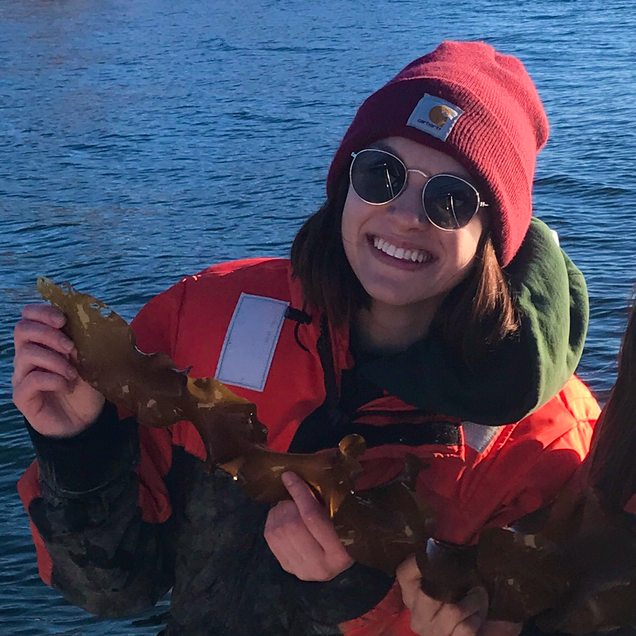
Congratulations to Biology Ph.D. student Alex Geisser for her new paper published in Frontiers of Marine Science, titled “Macroalgae Host Pathogenic Vibrio Spp. in a Temperate Estuary”, co-authored with mentor Wally Fulweiler and a collaborator from Roger Williams University. The study reveals that macroalgae commonly harbor pathogenic Vibrio species, offering a protective microhabitat for these pathogens.
 Congratulations to PhD student Maria Valadez Ingersoll of the Davies lab for being awarded the WHOI Postdoctoral Fellowship, starting in September 2025. She is a previous National Science Foundation GRFP awardee, received the URBAN Broadening Participation Award 2021, and has received numerous awards while at BU including: URBAN Research and Travel Award 2021, Biology Travel Award 2021, Graduate Student Organization Conference Travel Grant, BU Genome Science Institute Pilot Award, Fall 2023 Biology Travel Award, BU Marine Program Warren McLeod Summer Award 2024. Lastly, she was the runner up for the Division of Ecoimmunology & Disease Ecology (DEDE) Best Student Paper (Oral Presentation) competition and was awarded the 2024 GSI Research Symposium Grand Prize ($10,000). Maria is co-mentored by Tom Gilmore and Sarah Davies.
Congratulations to PhD student Maria Valadez Ingersoll of the Davies lab for being awarded the WHOI Postdoctoral Fellowship, starting in September 2025. She is a previous National Science Foundation GRFP awardee, received the URBAN Broadening Participation Award 2021, and has received numerous awards while at BU including: URBAN Research and Travel Award 2021, Biology Travel Award 2021, Graduate Student Organization Conference Travel Grant, BU Genome Science Institute Pilot Award, Fall 2023 Biology Travel Award, BU Marine Program Warren McLeod Summer Award 2024. Lastly, she was the runner up for the Division of Ecoimmunology & Disease Ecology (DEDE) Best Student Paper (Oral Presentation) competition and was awarded the 2024 GSI Research Symposium Grand Prize ($10,000). Maria is co-mentored by Tom Gilmore and Sarah Davies.
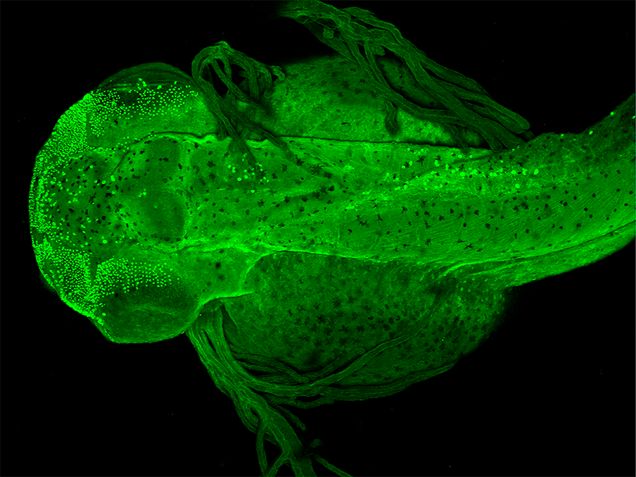
Congratulations to PhD student Maria Jose (Majo) Salazar-Nicholls from the Warkentin lab for the recent publication of their paper “Functional Morphology of Hatching: Ontogeny and Distribution of Hatching Gland Cells in Red-Eyed Treefrogs and a New Marker for Anuran Hatching Enzyme”. Red-eyed treefrog embryos hatch early to escape danger, using rapid, regulated hatching enzyme release. Using a custom antibody, Majo found they have super-abundant, broadly distributed, long-lasting hatching glands – features related to hatching plasticity and performance. The antibody will facilitate comparative research on frog hatching.
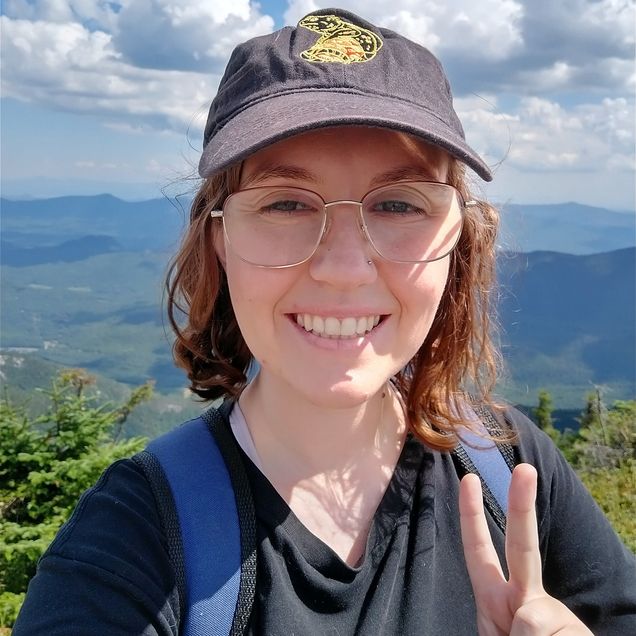
Congratulations to PhD student Jordan Smith for being awarded an Animal Behavior Society Student Research Grant in the amount of $1,570 for her proposal titled “Taste and Task: Gustatory Polyphenisms and Division of Labor in a Leafcutter Ant.”

Congratulations to recent BU graduates, Selby Vaughn from Biology and Carina Terry from E & E, for their recently published paper, “Local soil temperature advances flowering phenology of Canada mayflower (Maianthemum canadense), with implication for climate change assessment”, co-authored by Professor Richard Primack. Their recent publication shows the local soil temperature affects the flowering times of a spring wildflower, which has implications for climate change research.
2025 Graduate Student Awards
Congratulations to the following Graduate Students for receiving department awards so far this year!
Alistair Economakis Summer Award for outstanding achievement in Marine Science:
JK Da-Anoy (Davies Lab)
Belamarich Dissertation Writing Award:
Abby Robinson (Mullen Lab)
Brenton R. Lutz Award for outstanding achievement in Neurobiology:
Guangmei Liu (McCall Lab)
Charles Terner Award for outstanding achievement in Cellular and Molecular Biology:
KathrynAnn Odamah (Man Lab)
Dana Wright Fellowship for outstanding achievement in Marine Biology:
Ninon Martinez (Finnerty Lab)
Marion R. Kramer Scholarship for outstanding achievement by female PhD candidates in Biology (2 awards):
Sabrina Kistler (Ho/Beffert Lab)
NSF Graduate Research Fellowships Program – Honorable Mentions:
Alejandra Castillo Cieza (Bhatnagar Lab)
Anne Curtis (Chantranupong Lab)
Emma Daily (Templer Lab)
Abigail Fowler (Tay Lab)
Sara Alexis Parker (Strickland Lab)
Outstanding Teaching Fellow Award in Biology:
Wei Wang (Gilmore Lab)
Outstanding Teaching Fellow in Biology – Honorable Mention:
Abby Robinson (Mullen Lab)
Outstanding Teaching Fellow Award in BU Marine Program:
Lili Vizer (Buston Lab and Davies Lab)
Outstanding Teaching Fellow Award in Molecular & Cell Biology and Biochemistry (MCBB):
Jackson Ho (Perlstein Lab)
Thomas H. Kunz Award, for outstanding achievement in EBE:
Izzy Novick (Mullen Lab)
Warren McLeod Summer Award for outstanding achievement in Marine Biology:
Jacob Jaskiel (Rotjan Lab)
Peter Schroedl (Marlow Lab)
Lili Vizer (Buston Lab and Davies Lab)
Lab Spotlights

Bhatnagar Lab: Thanks to funding from the DOE BER Award, the Bhatnagar Lab will test how elevated CO2 (eCO2) concentrations, combined with increased temperatures and drought, will impact plant-soil-microbe interactions using metatranscriptomics of soils and roots from a long-term eCO2 experiment in eucalyptus forests of Australia: EucFACE. The Bhatnagar lab also received Leap of Faith Technologies, Inc. Award where they will use novel forest microbiome restoration methods to restore forest ecosystems, including native plants and fungi that can store carbon, support biodiversity, and provide ecosystem services, in post-fire urban agro-environments of Northern California.
Davies Lab: The Davies lab traveled to Bocas de Toro, Panama in collaboration with the Wang lab from Boston College to conduct research on the influence of diel thermal variability on coral performance. The team conducted thermal performance curves on many corals, set up a one year reciprocal transplant and deployed many water sensors.
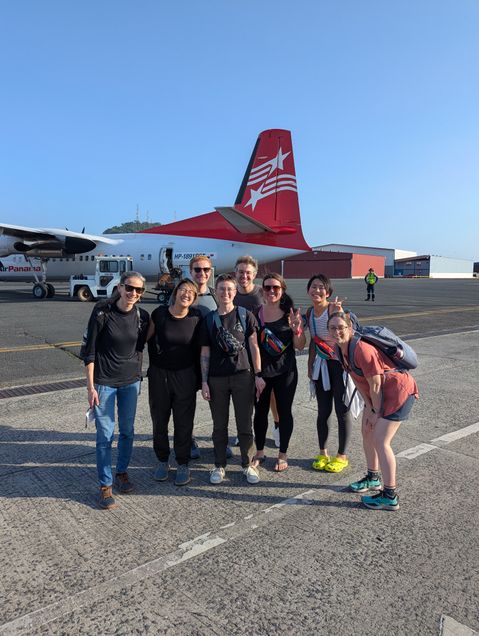
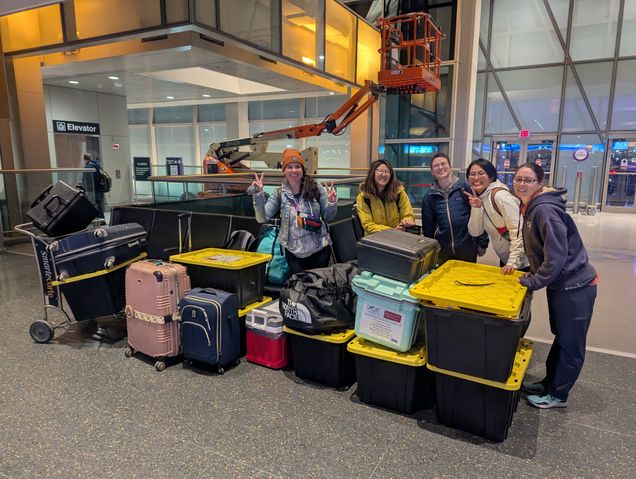
What’s New?
Professor James Traniello was interviewed for CAS “The Big Question” series. Professor Traniello alongside two other CAS faculty members share their thoughts on the question, “What is Leadership?”

Professor Joe Larkin and his wife, Kristi, recently welcomed baby boy Jordi Paul Larkin to their family on January 28th, 2025. Congratulations Kristi and Joe!
Recent Events
Wednesday March 5th, 10-11 am
Hope in a Time of Climate Anxiety. The departments of Earth & Environment and Biology, BU URBAN, and Biogeoscience are bringing together students and faculty to discuss the future of global health, climate research, and action in the face of uncertainty and dwindling resources.
Monday March 17th, 10:10-11:30 am
Business, Marketing, and Consulting Career Panel, hosted by Zeba Wunderlich, featuring…
– Sam Gan, PhD, Strategic Marketing Analyst, GenScript
– Miho Kaneko, PhD, Senior Associate and Patent Attorney, Goodwin LLP
– Gavin Lagani, PhD, Senior Scientist, MeiraGTx
– Mandy Pinheiro, PhD, Entrepreneurial Fellow, Chicago Biomedical Consortium
Monday March 31st, 3:30 pm
Respectful Research roundtable: A DEI Conversation for Biogeoscience. This year, we are holding a roundtable discussion on how we can approach current and future DEI practices for our program and Biogeosciences in general, given the political climate. We are honored to be joined by Dr. Vincent Stephens, Associate Dean for Diversity and Inclusion and Dr. John Celenza and Barkha Shah, both on the Biology Antiracism Committee.
Upcoming Events
Monday April 28th, 11 am – 2 pm
Biology Master’s Research Symposium in LSE 103.
Monday May 12th, 1-5 pm
Annual Biogeoscience Symposium. This year’s symposium will feature a panel of BU Biogeoscience Alumni who work at U.S. National Labs including University of Rhode Island faculty member Pat Sorensen of the Lawrence Berkeley National Lab, and Nia Bartolucci of the US Environmental Protection Agency (EPA). There will be a reception at the BU Pub immediately following the symposium.
Wednesday May 14th, 1-4 pm
Annual URBAN Symposium. This year’s symposium will feature several talks by students and an alumni panel.
Clubs and Athletics
Women’s Health Pre-ARC, the Evans Center
Consider joining the Evans Center for Interdisciplinary Biomedical Research (Katya Ravid, Director) new BU Women’s Health Pre-ARC. The Pre-ARC’s objective is to bring together women’s health researched from across BU to a foster community, mentor relationships, and share knowledge and resources on women’s health topics.
BU Biology Alumni and decorated Track & Field athlete, Emma Montoya (CAS’22, GRS’23), has qualified for the 4 x 400 meter relay at the 2025 World Athletics Relays in Guangzhou, China. She will be competing on behalf of the French National Team.

Recent Publications
Aichelman, H. E., Benson, B. E., Gomez-Campo, K., Martinez-Rugerio, M. I., Fifer, J. E., Tsang, L., Hughes, A. M., Bove, C. B., Nieves, O. C., Pereslete, A. M., Stanizzi, D., Kriefall, N. G., Baumann, J. H., Rippe, J. P., Gondola, P., Castillo, K. D., & Davies, S. W. (2025). Cryptic coral diversity is associated with symbioses, physiology, and response to thermal challenge. Science Advances, 11(3), eadr5237. https://doi.org/10.1126/sciadv.adr5237
Bandyadka, S., Lebo, D. P. V., Mondragon, A. A., Serizier, S. B., Kwan, J., Peterson, J. S., Chasse, A. Y., Jenkins, V. K., Calikyan, A., Ortega, A. J., Campbell, J. D., Emili, A., & McCall, K. (2025). Multi-modal comparison of molecular programs driving nurse cell death and clearance in Drosophila melanogaster oogenesis. PLOS Genetics, 21(1), e1011220. https://doi.org/10.1371/journal.pgen.1011220
Dixon, C. T., Yang, P., & McCall, K. (2025). Traumatic injury leads to ovarian cell death and reproductive disturbances in Drosophila melanogaster. Biology Open, 14(2), BIO061825. https://doi.org/10.1242/bio.061825
Dulberger, K. N., La, J., Li, A., Lotfollahzadeh, S., Jose, A., Do, N. V., Brophy, M. T., Gaziano, J. M., Ravid, K., Chitalia, V. C., & Fillmore, N. R. (2025). External validation of a novel cancer-associated venous thromboembolism risk assessment score in a safety-net hospital. Research and Practice in Thrombosis and Haemostasis, 9(1), 102650. https://doi.org/10.1016/j.rpth.2024.102650
Geisser, A. H., Scro, A. K., Smolowitz, R., & Fulweiler, R. W. (2025). Macroalgae host pathogenic Vibrio spp. In a temperate estuary. Frontiers in Marine Science, 12, 1549732. https://doi.org/10.3389/fmars.2025.1549732
Grupstra, C. G. B., Meyer‐Kaiser, K. S., Bennett, M., Andres, M. O., Juszkiewicz, D. J., Fifer, J. E., Da‐Anoy, J. P., Gomez‐Campo, K., Martinez‐Rugerio, I., Aichelman, H. E., Huzar, A. K., Hughes, A. M., Rivera, H. E., & Davies, S. W. (2024). Holobiont traits shape climate change responses in cryptic coral lineages. Global Change Biology, 30(11), e17578. https://doi.org/10.1111/gcb.17578
The Davies lab has been exploring similar patterns of cryptic diversity in populations of Pacific and Caribbean reef-building corals. In both cases, three cryptic lineages were detected and these lineages associated with different algal symbionts and microbiomes and they exhibited strong functional variation. The team is now following up on this research so there will be more to come!
Hicks, G. L., & Lobel, P. S. (2024). An examination of the effects of dorsal fin-mounted spot on carcharodon carcharias, the great white shark. Fishes, 9(6), 231. https://doi.org/10.3390/fishes9060231
This editorial questions existing practice of how sharks are tagged.
Laboury, S., Parmentier, E., & Lobel, P. S. (2025). Are there individual acoustic signatures in the damselfish Dascyllus albisella ? The Journal of the Acoustical Society of America, 157(1), 48–56. https://doi.org/10.1121/10.0034790
This paper shows that this damselfish cannot be individually identified by acoustics alone.
Mick, S. T., Carroll, C. L., Uriostegui-Arcos, M., & Fiszbein, A. (2025). Hybrid exons evolved by coupling transcription initiation and splicing at the nucleotide level. Nucleic Acids Research, 53(3), gkae1251. https://doi.org/10.1093/nar/gkae1251
Primack, R. B., Vaughn, S., & Terry, C. (2025). Local soil temperature advances flowering phenology of Canada mayflower (Maianthemum canadense), with implications for climate change assessment. Oecologia, 207(2), 36. https://doi.org/10.1007/s00442-025-05668-6
Salazar‐Nicholls, M. J., Bazante, H. M., & Warkentin, K. M. (2025). Functional morphology of hatching: Ontogeny and distribution of hatching gland cells in red‐eyed treefrogs and a new marker for anuran hatching enzyme. Journal of Morphology, 286(2), e70029. https://doi.org/10.1002/jmor.70029
Subramaniam, S., Napoleon, M. A., Lotfollahzadeh, S., Kamal, M. H., Kurniawan, H., Elsadawi, M., Kenney, D., Douam, F., Bosmann, M., Whelan, S., Cabral, H., Burks, E. J., Zhao, G., Kolachalama, V., Ravid, K., & Chitalia, V. C. (2025). Tryptophan metabolism reprogramming contributes to the prothrombotic milieu in mice and humans infected with SARS-CoV-2. https://doi.org/10.1101/2025.01.17.633602
